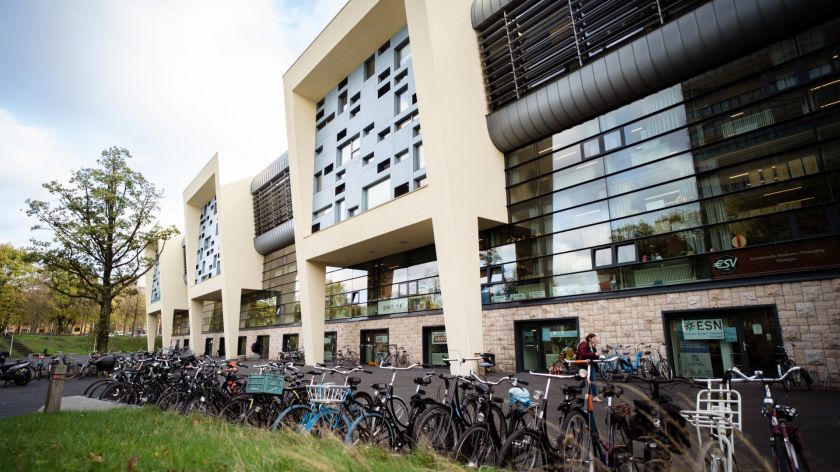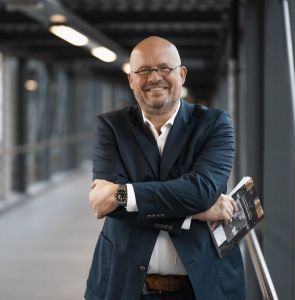How the management faculty can recover: ‘The administrative arrogance must go’
-
 Het Elinor Ostromgebouw, waar het kantoor van studentenvakbond AKKU gevestigd is. Foto: Johannes Fiebig
Het Elinor Ostromgebouw, waar het kantoor van studentenvakbond AKKU gevestigd is. Foto: Johannes Fiebig
How to address the crisis within the management faculty? At the request of Vox, three professors delve into that question. The answer is neither short nor simple, but the professors want to contribute to a solution. 'I feel it is a moral obligation to be optimistic.'
Professor Inge Bleijenbergh is exhausted and disheartened by what the crisis has caused in her faculty. ‘Especially when I see the impact it all has on young staff, on their motivation, and their sense of security. They want to know what to expect when it comes to research time, conference attendance, and the chances of a permanent position or promotion.’

Professor of Geography Arnoud Lagendijk explains that, since he is no longer a department head and recently started working halftime for the General Education Union (AOb), he has a bit more distance to the situation. However, he hasn’t been oblivious to the consequences of the crisis for staff. ‘It affects people enormously; absenteeism is increasing. There’s a term in organizational theory: muddling through. In our department, over the past year, we sometimes felt like we were going backward instead of forward.’
According to Professor of Accounting Frank Hartmann, he has gradually reached a breaking point. ‘Recently, for the first time in my career, I went to see the company doctor. Not so much to talk about my own feelings, but mainly about those of the people I’m responsible for. I also hear alarming stories from junior staff in other departments. The situation is gradually becoming unworkable.’
From million-dollar deficits to discrimination
There has been much discussion about the crisis at the management faculty in recent months. After the faculty revealed a multi-million-euro deficit at the beginning of this academic year, crisis measures were implemented. This was followed by a conflict of trust between the management and the Participational Bodies, and the unions sent a letter to the Faculty Board about intimidation and discrimination in the workplace.
However, there are also signs of improvement. For example, the Participational Bodies were cautiously optimistic after the first meeting with the new executives – Saskia Lavrijssen is the new dean of the faculty as of March 1, and Jolle Landman started as Director of Operations shortly before that.
How can the faculty continue the path it has taken? This is the subject of an interview with the three professors. They have indicated in advance that they mainly want to look forward and think about ways the faculty can climb out of the crisis. However, as the conversation reveals, this is impossible without occasionally looking in the rearview mirror.
What are the biggest challenges for the faculty right now?
Arnoud Lagendijk: ‘When I was still a department head, I noticed that simple things like promotions and extending professor positions took up a lot of time. Management also involves organizing these basic processes well. Because secretary positions have been eliminated and ICT facilities are not being utilized properly, it’s currently difficult to make appointments in our faculty. Again: it sounds very basic, but that’s why things are getting stuck.’

‘From the top, I see too much micromanagement. Management interferes with the details of courses and even lectures, while there is hardly any substantive direction for major ambitions, such as setting up a research master and facilitating interdisciplinary education. What has been achieved in this regard has largely been thanks to energy from below.’
‘Some departments are performing well, but academic disciplines compete and get in each other’s way.’
‘We need to set priorities. Our faculty has all the knowledge in-house, so it’s very ironic that the development, implementation, and execution of the strategy have gone so poorly. Departments like the education center, communication, and HR are doing fine work, but at the same time, they struggle enormously to keep up – especially with the current hiring freeze. At some point, you end up in a vicious cycle, leading to more and more people dropping out.’
Frank Hartmann: ‘Not only the processes but also the structure of the faculty needs an overhaul. Some departments are doing well, but academic disciplines compete and get in each other’s way. Because departments and programs overlap, interests diverge. There needs to be a structure where programs are separate from academic disciplines. What I find remarkable about this faculty is that due to internal competition between academic disciplines, we are extremely inward-focused, rather than collectively looking outward.’
Lagendijk: ‘Ultimately, it’s about channeling energy to the right places. Within this faculty, there’s a strong sense that we always have to reinvent the wheel ourselves. But just take the good practices from other faculties or universities and harness the power from the bottom up. Only start inventing something yourself when it’s really necessary.’
Where do things go wrong?
Hartmann: ‘Take the so-called hotspots, interdisciplinary research groups. They emerged a few years before I started here (in 2020, eds.). Because they don’t fall under existing departments, they add a new dimension to the organization, which is extremely complex because not everyone does research in a hotspot. As a result, they havestarted leading their own life alongside the regular structure. Some hotspots work well, but others have become isolated islands, preventing people from connecting – and some people have been ousted from certain hotspots.’
Inge Bleijenbergh: ‘For me, the hotspots are safe havens. It’s one of the few places in the structure where the multidisciplinary nature of our research comes to life. They are now operating with limited resources because the budget is small, and they have no staffing authority. Therefore, I would strengthen the hotspots.’

Hartmann: ‘I would even make them lead research projects. But then new hotspots need to be added, because there wasn’t much room left for latecomers. Those are the kinds of choices you need to make.’
What should the faculty management prioritize as soon as possible, in your opinion?
Bleijenbergh: ‘A clear research strategy. Interdisciplinarity is one of the faculty’s key points, but research is still organized by discipline, despite the existence of hotspots. If you want to realize interdisciplinary projects, embedding them within the faculty, financially and in terms of personnel policy, is a huge challenge. With cuts in research time and conference travel, ambitious researchers feel discouraged. Yet, that’s our greatest strength: understanding complex problems from various perspectives and providing an analysis that does justice to that complexity. It would be good if the faculty management states where it wants to go.’
Hartmann: ‘The same goes for education. You need to look at the program you want to have at the faculty level and ensure that the structures don’t work against each other. For the business economics and business administration programs – which I handle myself – and for economics, there is a lot of national and international competition. Our students often leave for the Randstad after their bachelor’s because they think they’ll be better off there. We’re letting that happen too easily; in the current structure, we’re not collectively working on a solution.’
Lagendijk: ‘It’s also about collaboration. Management spends a lot of time on course learning objectives or on accreditation. But when employees from the Department of Economics, as well as the Geography, Spatial Planning and Environmental Department (GPM) want to collaborate on education in sustainability, nobody responds. People who take initiative do it against the tide of the faculty. There needs to be a culture where good ideas from employees are recognized and used. That requires stronger management, with a daily presence on the shop floor.’
Speaking of culture: a month ago, union representatives handed a distress letter to the faculty management. Among other things, it stated that employees are intimidated and discriminated against. What needs to change?
Bleijenbergh: ‘We need to move towards a culture where it’s natural to give positive feedback, to say that people have good ideas. A culture where leaders say, “Oh, what a good plan, shall I help you with it?”, instead of pointing out what’s missing. Leaders – including myself – should invite employees to give feedback on what they can improve. I would also like to see more appreciation for mentoring junior staff. It should be natural that mentoring requires a lot of time and attention and that it also involves the socio-emotional process of personal development.’
Hartmann: ‘When I started here three and a half years ago, I encountered the harshest culture of accountability I had ever experienced. In every meeting, the number of publications by staff was mentioned down to two decimal places. Fortunately, that has stopped, but nothing has replaced it. Academic mentoring does indeed take time. For example, you should ask more often at the end of the afternoon or in the hallway how staff are doing or how they see their place in the competitive academic world in the future. At Radboud University, considering our Catholic roots, we could be emancipatory in that.’
‘As for Recognition and Appreciation, a lot is happening at the central level, but it’s hardly being implemented at the faculties.’
Bleijenbergh: ‘Regarding Recognition and Appreciation, we’ve worked hard with the Participational Bodies, but sometimes it seems like in practice, we’re still doing the opposite: holding people accountable based on how many grants they bring in or the number of publications. I think it’s important to also focus on educational innovation and organizational citizenship.’
Lagendijk: ‘Regarding Recognition and Appreciation, a lot is happening at the central level, but it’s hardly being implemented at the faculties. It also seems very difficult to create a culture where we no longer individually evaluate employees based on their performance. Ultimately, you want to reach a point where teams are held collectively accountable. We’re still very far from that.’
Do leaders pay enough attention to the development opportunities for women within the faculty?
Bleijenbergh: ‘I hear that a significant number of women in the middle layers of the organization are stagnating, even though they deserve to move up. They feel they are being judged based on the money they bring in, the number of publications, and on leadership. The lens through which we view leadership is one-sided. Leadership also means conducting socially relevant research and fostering an environment where people can develop.’
On another note: the financial crisis of the faculty is not yet over. The new dean says she would like to raise more funds. Do you see ways to do that?
Bleijenbergh: ‘There are certainly possibilities, for example, by continuing to focus on acquiring funds through European subsidies or through science financier NWO. I don’t want to complain too much, but the story now is that we can only apply for limited external subsidies because otherwise, the faculty would have to contribute too much. This has to do with co-financing and overhead costs. But that’s counterproductive: we could bring in enough resources if we could continue the research that companies and governments are willing to pay us for. As for the future funding stream from The Hague for education, it doesn’t look good, but that’s just one of the three sources of income we have. Now, the other two income sources are being squeezed as a result.’
‘The only real program within the Radboud Management Academy, business administration, did not start this year.’
Hartmann: ‘Opportunities also lie in postgraduate and extracurricular education. The only real program we had within the Radboud Management Academy (RMa), business administration, did not start this year. Yet, it’s intended for people from the business world and government, so you can charge good prices for it. But it requires good organization. There are opportunities because, due to its integration into Radboud University, the RMa could be much richer than traditional business schools. Here on campus, we have the most advanced knowledge in areas such as artificial intelligence and neuroscience, as well as all humanities. There’s so much more we can do with that. At the same time, it’s a challenging market: it’s not just a matter of opening the floodgates and getting rich. It also requires administrative involvement and good internal structures.’
Lagendijk: ‘In geography and planning, we do a lot in the field of the knowledge economy and with migrants. We’ve tried to meet the high demand from municipalities and provinces through the RMa, but haven’t succeeded yet. We’ve provided training, but only from within our own department.’
In an interview with Vox, Dean Saskia Lavrijssen said her aim is to avoid a reorganization. What are your thoughts on that?
Bleijenbergh: ‘In an open faculty meeting, I said that we hear there’s no ongoing reorganization, but we can’t ignore that tasks are being redistributed because people are leaving and not being replaced. Those who remain are given additional tasks, increasing workload. It’s commendable that the management doesn’t want to lay off people, but those who stay don’t know what to expect. That’s why it’s important to acknowledge the current situation as a category 3 reorganization and engage in dialogue with the workforce. How can we best ensure that certain groups don’t disproportionately bear the burdens of the current situation?’
Lagendijk: ‘There should be a recognizable document where everyone knows: if that person leaves, this is the consequence. A clear narrative is needed so it can be collectively discussed.’
Hartmann: ‘If you rule out a reorganization, you’re essentially saying you don’t have a plan – but that we as employees don’t need to worry too much about it. That’s exactly the soothing tone we’ve heard so often lately, to conceal the fact that you have no idea where you’re going.’
Finally, do you have any last tips for the new executives?
Lagendijk: ‘I hope the new dean and director will be very present in the faculty. It’s almost a cliché, but we remember good managers because they often walked through the halls. The executives could, for example, attend more meetings of the hotspots. Come and listen to what’s going on.’
Bleijenbergh: ‘I think the new executives have made a good start by engaging in dialogue and listening to employees. Keep it up, I would say. Talk to people at the coffee machine, be approachable for small and big questions. Get to know people by face, make sure you know their names, and that you’re accessible.’
‘I come to the faculty every day with the idea: we’re in a tough situation, but we’re going to tackle it head-on.’
Hartmann: ‘That requires a very different style of leadership. Visibility is one thing, but bearing a collective responsibility is another. And let’s be very honest, that’s where the old leaders stumbled. The administrative arrogance needs to go. I’m not very optimistic about it, but I do want to contribute.’
Bleijenbergh: ‘I feel it as a moral duty to be optimistic. I come to the faculty every day with the idea: we’re in a tough situation, but we’re going to tackle it head-on, and I want to stay in touch with my colleagues throughout. I want to help ensure that all smart and dedicated people have a safe and inspiring work environment.’
Hartmann: ‘Radboud University is a fantastic university with expertise in each of the major societal challenges we will have to face. That’s what attracts students and researchers to Nijmegen. That’s why I also moved here from a regular business school. It’s a strength to work with.’
Translated by Siri Joustra



